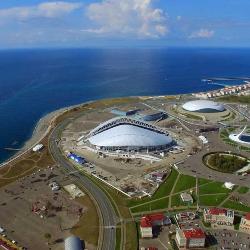Sochi Gambling Zone Development to Attract Tourists

Before nearly every Olympics, the host country ends up investing huge sums of money to build grand stadiums to hold the events, and construct facilities to house athletes while the games take place. Everything is used during the games themselves but after the 16 day extravaganza draws to a close, those facilities usually end up going to waste, sitting empty while governments are still repaying what it cost to build them.
Over the years, different countries have tried to make use of the space in different ways; sometimes, the buildings are re-purposed, while other times, they are used for events or transformed into hotels or parks. For Sochi, the Russian location which hosted the 2014 Winter Olympics, the country has finally devised a plan to convert the area along the Black Sea into a gambling destination.
A Plan Put Into Action
In August, the Prime Minister of Russia, Dmitry Medvedev, signed an order to establish a gambling zone in the area. The zone will span 165,000 square feet in the mountainous portion of the city of Sochi at the location of the Rosa Khutor and Gorki Gorod ski resorts. According to the plans, the gambling zone will be open in late 2016.
Nevertheless, the framework for the gambling zone was already in place before Dmitry Medvedev signed the order. Back in 2014, the Russian government passed a law that stated that the facilities built for the 2014 Winter Olympics in Sochi could be developed by private investors for various purposes, including gambling. The law was needed, as gambling has only been permissible in state-approved zones since July 1, 2009.
Lofty Goals
By converting the Sochi facilities into gambling resorts, Russia is hoping to help recoup the money invested in the Olympic Games more quickly. All in all, the country borrowed $3.7 to $3.9 billion to erect the facilities in Russia, and by now allowing private casino operators to offer gambling, Russia can tax gross gaming revenue in order to hopefully make larger payments on these loans.
The Target Market
Russia isn’t banking on Russian citizens flocking to the casinos in Sochi, though., and is instead hoping to attract tourists from China to its gambling venues. In fact, Tibet Airlines has already stated that it plans to begin providing nonstop service from Chengdu in the Sichuan province to Sochi in order to shuttle gambling tourists to and from the resorts.
But Will They Come?
It is difficult to predict how successful the ambitious plan will prove, as a high level of competition for Chinese gambling dollars already exists. New resorts are being built in Macau in order to attract Chinese tourists, while Hong Kong, Singapore and many other countries in the region have resort casinos that cater for Chinese tourists. Furthermore, the anti-corruption push in China has dramatically reduced the numbers of Chinese high rollers prepared to travel for gambling, and all of the existing properties in Asia are now pushing hard for a share of what market still remains.
Russia Reducing the Competition
Russia is already taking steps to reduce domestic competition for the proposed Sochi gambling zone by shutting its only other approved gambling zone in Azov City. Located around 340 miles away in the south of Russia, Azov City opened its first legal casino back in 2010, with the venue’s owner, Royal Time Group, initially having planned to open two more resorts in Azov City by 2018. The Russian governments decision to now shut down Azov City’s gambling industry in favor of Sochi is forecast to cost investor’s losses in the region of 8.6 billion rubles ($133m), although the operators are expected to compensated for their losses.
As well as taking gamblers away from Azov City, Russia is also hoping to draw customers away from nearby countries, such as the Georgian city of Batumi located around 235 miles away. However, as Teimuraz Vashakmadze, professor of the Institute of Business Studies at the Russian Presidential Academy of National Economy and Public Administration, explains:
“Compared to Batumi, Sochi will not present a very strong competition. In Batumi, in addition to the local population and tourists from Russia, there are a lot of players from Turkey, Iran and Azerbaijan.”








